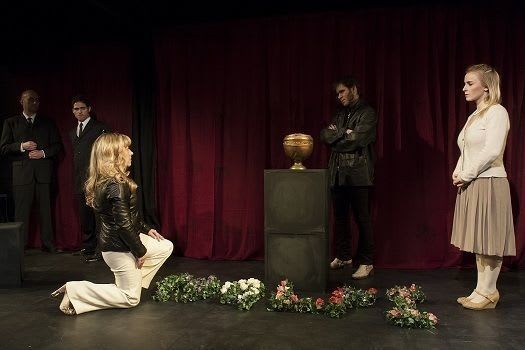Jacobean drama has certainly been a strong presence on the British scene in the past year—from Middleton and Rowley's The Changeling at Southwark Playhouse to Heywood's A Woman Killed With Kindness at the National Theatre, as well as Ford's own ‘Tis a Pity She's A Whore at the Barbican. The Old Vic will be staging a version of the Duchess of Malfi later this month, and Greenwich Playhouse's founding and resident company Galleon Theatre have aptly chosen as their final play at the venue a dark, gothic, sexual revenge tragedy appropriate for the intimate, confrontational upstairs space.
Unfortunately, it's a production that starves for attention, displacing all the flavour of the Jacobean tragedy for a low-key marathon through its sexual nuances; it's a poor production—but this shouldn't be any excuse to justify the closure of the theatre, or the lack of support from the local council in finding a new home for the company in the local area.
The narrative remains quite loyal to Webster's original, portraying the downfall of the Duchess of Malfi who marries steward Antonio to the disappointment and fury of her two brothers: Ferdinand and the Cardinal himself. Whilst Ferdinand becomes increasingly prone to violent outbursts, he sends Bosola, sentenced to the galleys for murder, to spy on the Duchess so he can prove her guilt.
This re-imagining of Duchess of Malfi is an exercise in excess that clouds the play, reducing it to a curious pastiche, from the Cardinal's vicious and vulgar public displays of erotic fascinations to power struggles dominated by reductive gender supremacy and a tone that displaces any danger from those currencies of lust and violent catapults of authority. It's a naive and at times highly problematic staging that contradicts the play's exploration of female identity in a patriarchal society enforced through religious systemics.
For such a gothic, candle-lit vigil to Jacobean drama, suspense is played out before it emerges in the thick fog of the plot, thus displacing any emotive power from the unfolding events. The religious undertones of Webster's tragedy are overshadowed by a curious over-emphasis—a reductive linking of the play's sexual politics with its critique of religious practice. This dominating dramaturgical device throws off the mechanics of the play itself, reducing the protagonists to pawns in a convoluted love triangle, unaided by the atemporarlity of the production. If the contemporary costumes—a distinct and elegant feature of the production designed by Natasha Piper—ground the adaptation in a contemporary discourse, the rest of the visual language becomes counter-intuitive—daggers and guns, sacrosanct Bibles and a set of body-guards that suddenly become the Spanish Inquisition, as well as an indistinct soundtrack that uses cinematic language to provoke emotional response, whilst occasionally throwing in some heavy metal.
What's striking about Galleon Theatre's production of Duchess of Malfi is the lack of consideration for the nuances of the heroine's character; instead of an authoritative, dominating and emancipated risk-taker, she is portrayed as arrogant and stubborn, thus displacing any hierarchy of characters that can sustain the politics of the play. This emphasis on the after-effect of a character's action rather than its significance means the acting in the production feels, at times, misdirected, anticipating the emotion before it surfaces and removing the subtext that provides the play its texture. Notable exceptions are Damian Quinn as Bosola, Emma Grace Arends as dutiful Cariola and Martin Foreman's physically vivid and playful rendition of one of the Cardinal's Men.
Produced by Alice De Sousa and directed by Bruce Jamieson, Duchess of Malfi is a weak albeit ambitious production that, in its attempt to shout loudly about struggles that still dominate contemporary society, levels the subtext and political undertones of Webster's play. That being said, it would be a mistake to pinpoint the work of this resident theatre company on just one production, and Galleon Theatre's loss of a home and the inherent closure of the Greenwich Playhouse are certainly a cultural loss that deserves more attention.
